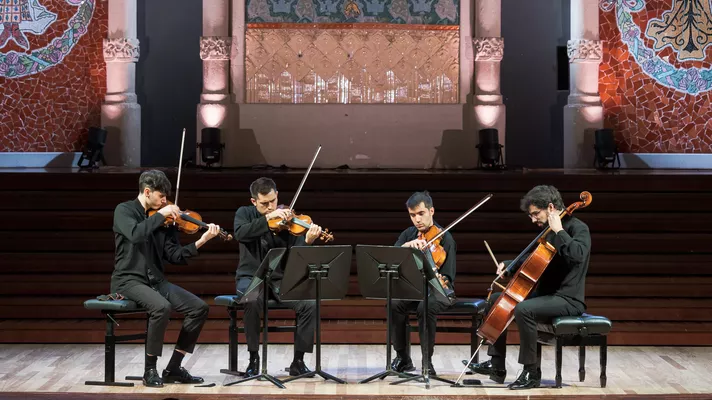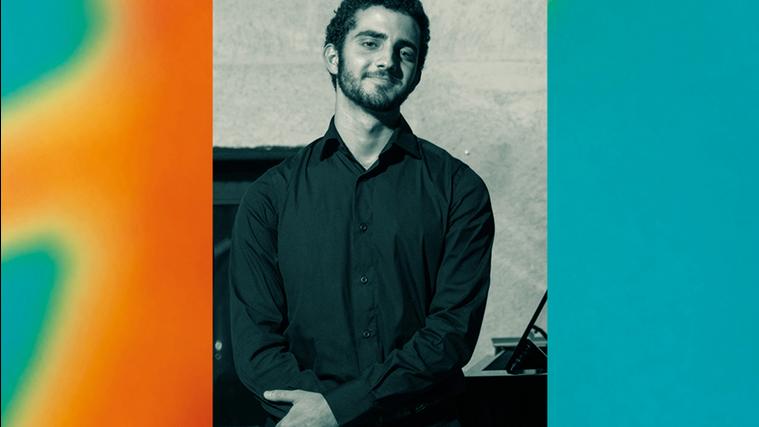
El Primer Palau Marathon
This event has already taken place. We invite you to explore the current program
El Primer Palau Marathon
Details
The First Palau returns with a new edition in a marathon format of 7 concerts for all those eager to dive into the future! This year, with the theme of human heroism, the young talents selected for this concert-cycle reflect the superpower of performing music that stirs emotions and the courage to do so in front of an audience in a majestic temple like the Palau.**
Do you already know our heroes and heroines for the 2024 edition?
The Artist Who Listens
Violinist Raquel Areal attended classical music concerts from a young age, even though her parents were not musicians. Her sister, Sara, started studying the violin, and she simply wanted to follow in her footsteps. From there, it became a key part of her life. What best defines her as a musician is her ability to "listen"—to the music and her fellow musicians to trace the best paths. At the Palau, she will pay tribute to her native Galicia with *Emigrantes Celtas* by Manuel Quiroga, a piece dedicated to the homesickness of the homeland.
The Artist Who Explains
In Álvaro Fernández's home, piano music was always playing—*The Goldberg Variations*, Chopin’s concertos… When a toy piano arrived on Twelfth Night, he understood it was his turn. While other students grew bored in music lessons, he gained confidence and strength with the instrument. "He’s not bad at it," they said, although technically, he didn’t choose the piano—his mother did. A brilliant intuition. Now, as a musician with great promise, all he wants is for people to "understand" what he plays. So simple, yet so powerful. At the Palau, he will tell a challenging story: the music of Kurtág. "It’s a bit scary because it has so few notes, and it strips you bare." Giving the maximum with very little.
The Instrument as a Conjurer of Emotions
At the music school in Solsona, the day came when students could try out instruments to choose their lifelong companions. Gerard Flotats tried the cello, and with the best possible ingredients—freedom and curiosity—he formed a living connection. "None of the other instruments made me feel the same way; I was instantly captivated, both by its sound and the sensations it gave me." This epiphany has led him to the Palau. Along the way, his love for music triumphed over his passion for mathematics and physics. Baroque, folk, and electronic music… But it’s the cello that gives him the power to convey the lyrical beauty of a Rachmaninoff piece, composed during the Russian composer’s deep depression and healing like an enigmatic medicine. A true act of heroism.
The Patience of Talent
A cello stood behind the door of Guillem Gràcia’s room for a long time, a watchful specter that was, in fact, waiting. His sister’s small cello eventually drew him in when he was only five years old. Since then, this young artist from Terrassa has become a sound aesthete, outlining the sonic paths of the music in his head. This is the true and titanic quest of the artist, and the program he brings to The First Palau has a personal and special touch. Brahms' *Lerchengesang*, in particular, stands out as an evocative miracle. "With just four notes, he creates a unique abstraction." Four notes to build an entire universe.
The Joy of Being Different
The euphonium isn’t usually among the top choices for young musicians. This unusual wind instrument came into Raúl Sabiote's life by chance. The euphonium, the younger brother of the tuba, has firmly taken root in the soul of this musician from Almería, the ideal companion for someone who, unsurprisingly, lives with an extremely active curiosity full of challenges. Raúl works, cooks, and lives with music, surrounded by inspiration and continuous learning. Among works by Schumann, Boutry, and Granados, Ángel Pérez Nieto emerges. "A very fun piece with lots of charm."
Going Together Toward Beauty
When four musicians come together, the stage is set for magic. The Vivancos Quartet was born with an exploratory spirit for colors and textures, like alchemists testing the finest fruits of musical history. Biel Ricart, Jordi Prim, Estela Megías, and Joaquim Tejedor are the four corners of a square full of complicity, both on and off stage, where the figure of the musician and the friend merge into a total life project. Friendship leads to delving into details, communication gives strength to the cohesion of dialogues, and unity and depth convey emotions. From moments of great serenity to dramatic instances—life itself. Including in Beethoven’s *Quartet No. 11*, which will crown their "search for purity," surrounded by the muses of the stage.
Performers
11 a.m.
Raquel Areal, violin
(Karla Martínez, piano)
: Nocturne
Emigrantes celtas
Sonata No. 6, in E major
Sonata for violin and piano, in G major
11:40 a.m.
Gerard Flotats, cello
(Julian Chan, piano)
Suite for solo cello
Papillon, op. 77
Komm, süßer Tod, BWV 478 (arrangement for cello and piano by Simon Parkin)
Sonata for cello and piano, op. 19
Break of 15 minutes (from 12:15 to 12:30 p.m.)
12:45 p.m.
Guillem Gràcia, cello
(Miguel Ángel Ortega, piano)
“Intermezzo” from Goyescas (arranged by Gaspar Cassadó)
Sonata for cello and piano, L. 135
Lerchengesang, op. 70, No.. 2 (arranged by Guillem Gràcia)
Beau Soir, L. 84 (arranged by Alexander Gretchaninov)
Le grand tango
Lunch break (1:45 p.m. to 3:30 p.m.)
3:30 p.m.
Raúl Sabiote, euphonium (proposed by Juventudes Musicales de España)
(Yuko Mizutani, piano)
Fünf stücke im Volkstone, op. 102
Mosaïque
“Oriental” from Doce danzas españolas, op. 37 (arranged by Raúl Sabiote)
Fantasía flamenca sobre las tres morillas de Jaén
4:10 p.m.
Quartet Vivancos
Biel Ricart, violin
Jordi Prim, violin
Estela Megías, viola
Joaquim Tejedor, cello
Quartet No. 12, D. 703, “Quartettsatz”
Quartet No. 11, 4n F minor, Op. 95, “Serioso”
: Sacrilège
4:50 p.m.
Álvaro Frnández-Bravo, piano
Study in C major, Op. 10, No. 1
Isolde’s Lievestod
Aura
Fantasy in B minor, op. 28
Játékok (volume I, selection)
Related news








